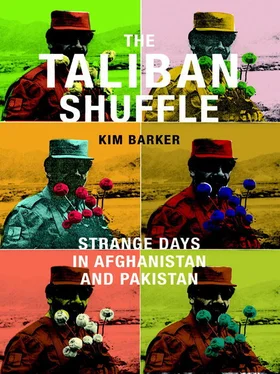But newly single and tempted by the excitement, I jumped into the abyss, throwing myself into going out at night, eagerly enrolling in Kabul High. One night, as I sat with security guys at the Gandamack, a new friend called, insisting on dragging me out. The car was full—I hopped in the back, the only woman with four men who seemed like longtime pals because we spoke the same language and that alone bred a sense of familiarity in a country as foreign as Afghanistan. A media consultant, a former U.S. Marine, a carpet expert, a married guy I didn’t really know, and me. We drove around, looking for the telltale neon sign, which meant only one thing in Kabul: a brothel. Finally a tiny two-story house had one, a rainbow of neon lights spelling out THE DELICIOUS BARBECUE in cursive neon script. When we knocked on the door, I almost hoped that the women would not answer.
“Wake up, whores!” announced the former marine, who liked to live up to his reputation for being an obnoxious jerk, as he pounded on the screen door.
Eventually the lights inside The Delicious Barbecue flickered on. Three sleepy Chinese women opened the door, and we walked into the narrow two-story building. The furniture in the front room was minimal, a few plastic chairs, a small wooden bar, all bathed in fluorescent lights that flattered no one. Everything here was hard: the concrete floors and walls, the women, even us. I brushed away the hand of a woman who evidently thought I looked like a better deal for the night than my friends. I smiled through my rejection. She shrugged.
We were here to sing. The women started setting up the karaoke machine and handed us some Heinekens, the beer that had somehow cornered the black market in Afghanistan. And then my social life, as usual, was interrupted by a work call.
It was the Taliban. They always called at the worst times.
I tried to postpone the translation with Farouq, but it was no use. He kept talking over me like the steamroller he was, flattening my useless protests and insistence that I did not have a notebook. No matter, Farouq plowed on. I put down my Heineken and stepped outside into the cool evening.
Earlier that day, Taliban leader Mullah Omar, the famously elusive one-eyed cleric who seemed about as likely to be photographed as cold fusion and was often described as “shy” with foreigners, had allegedly authorized an e-mail statement, urging his followers not to end their armed struggle. Farouq had finally reached the Taliban spokesman. I wanted to know whether the alleged Mullah Omar statement was legitimate and whether he was now surfing the Internet. Quickly, so I could go back inside. But Farouq never did anything quickly or halfheartedly.
“Give me the summary,” I said. “Please.”
Farouq, unforgivingly thorough and professional, was growing tired of me going out late at night and sleeping in late in the morning. He worried about my new adolescence. He most likely resented that he had to work, when he’d rather be with his family, and when I was out behaving like a teenager. By now, Farouq and his wife had a daughter, and his wife was pregnant with a second child. And by now, he had stopped talking about going to America to study medicine.
“No. Kim, it’s Eid tomorrow, and I don’t want you calling me and asking me for the translation because I will be with my family, so if it’s possible, can I just tell you what he said now?”
Eid al-Fitr was one of the most important Islamic holidays of the year, when Muslims gathered to celebrate the end of the holy month of Ramadan. For the past month, Farouq had not smoked, eaten, or drank during daylight hours, which meant he was crabby. He was hardly alone. Work hours at Afghan offices were typically cut to about 8 AM to 1 PM during Ramadan. It was impossible to accomplish anything. Suddenly realizing I should be grateful that Farouq had actually managed this interview on the last day of the fast—and suddenly realizing how inappropriate it was to be at a brothel on such a holiday—I agreed to spend some more time in the cold.
I sat down on the concrete steps leading into the yard. I pulled a pen out of my purse and three crumpled pieces of paper and scribbled notes on the interview. The claim of the Taliban spokesman: The e-mail was real.
So what, I thought. The fact that Mullah Omar was even making such a statement on the eve of the three-day holiday meant that the armed struggle was in trouble. By this point, November 2005, the Taliban seemed to be irrelevant in much of the country, a largely contained force, maybe two to three thousand men at best, mostly along the border between Pakistan and Afghanistan. Sure, roadside bombs occasionally exploded, like the one that had hit Crowley. But they were rare. Any comeback threat was just Taliban propaganda, an attempt to grab some media airtime in a war room where Iraq had sucked up all the oxygen.
From inside The Delicious Barbecue, the singing began. The media consultant belted out “Rhinestone Cowboy,” which caused the yard outside to come to life. The scraggly mutt, chained to the tree, pulled at his collar, jangling the chain. And the two pink-faced rhesus monkeys in the tiny cage, which for some reason I only then noticed despite their peculiar monkey smell, started to mate. Loudly. One monkey kept repeating the letter “e”—strangely, in time to the music.
Keeping up my charade of going to sleep would be difficult.
“Farouq. Farouq.” He kept talking.
“I have to go.” He kept talking.
I told him there were monkeys having sex to “Rhinestone Cowboy,” and I just couldn’t talk about the Taliban anymore.
That got him to stop translating. “Monkeys having sex?” he said, pausing before reconsidering his question. “Where are you?”
“In the garden.”
That satisfied him. After hanging up, I walked back inside.
“I signed you up for ‘Like a Virgin,’” the former marine said.
“Funny.”
My only previous attempts at karaoke had involved songs by the Violent Femmes and Guns N’ Roses—songs, in other words, where being able to carry a melody did not matter. But what the hell, I figured. Here I was, newly single and newly thirty-five, dressed in baggy jeans, a gray Arkansas T-shirt, and an orange hooded sweatshirt. More important, here I was in Afghanistan, where nothing really mattered, where any sense of self-consciousness had been stripped away.
“Like a virgin,” I sang. “Touched for the very first time.”
For three hours, the Chinese women sat in the plastic chairs against the wall, a jury of blank faces and folded arms that watched us sing, torturing such classics as Bonnie Tyler’s “Total Eclipse of the Heart” and Boney M.’s “Daddy Cool.” A random Western man occasionally showed up, stepped inside, and went upstairs draped with the woman of his choice. She would return and slump back into her chair after thirty minutes or so. Bored. At one point, several Heinekens into the evening, we pulled the women out of their chairs and tried to make them dance with us. Finally, we got a reaction. They started laughing. After 1 AM, we left to pick up kebabs, the Afghan equivalent of IHOP, before I kissed one of my new friends good night and fell face-first into bed. I was no longer just observing the bad behavior of the foreign community. Within weeks of my breakup, I had fully signed on.
CHAPTER 8
MESSAGE IN A BOTTLE
Many Afghans were not happy with the direction the country was heading, especially conservatives. And in the middle of this disgust, Abdul Jabar Sabit, a windmill-slaying Afghan lawyer, saw an opportunity. As legal adviser for the Interior Ministry, his job description was somewhat vague, so he decided to declare war on alcohol and brothels, to stem the tide of foreign excess. He had launched a one-man anti-vice mission, a pared-down version of the Taliban’s Vice and Virtue Ministry, that notorious charm offensive responsible for enforcing the regime’s straitjacket-like morality rules. And in so doing, Sabit had seized on the mood of many Afghans, who felt that the Westerners were just too much—too free with their booze, too loose with their morals, and too influential over young Afghans.
Читать дальше











